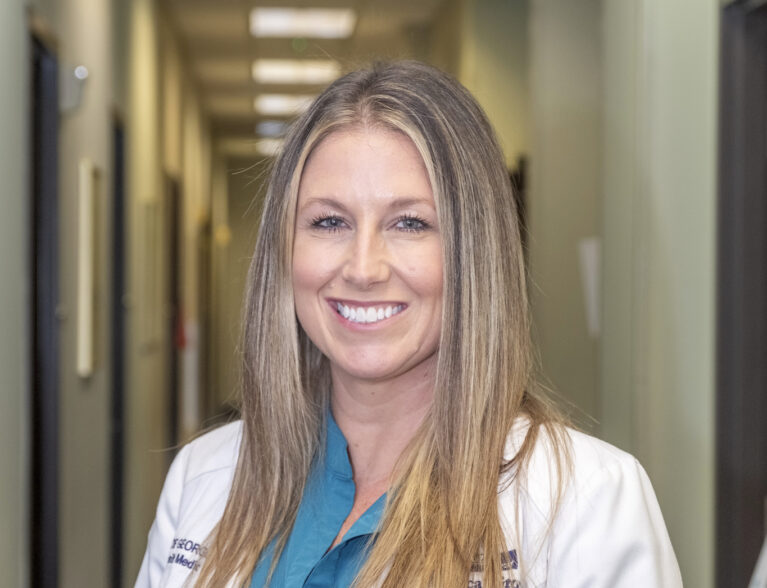
Most of us are familiar with fitness apps that let us count our steps or see the calories we’ve burned from exercising, but health apps do more than that today. Dr. Jayde George, who practices Family Medicine at Health First’s Holmes Regional Medical Center, is an enthusiastic fan of several newish apps and encourages her patients to use them. “Apps will never replace going to your medical provider, but the info you gather can give them data about your health, allowing them to make a better diagnosis.”
As an example, Dr. George says, “I really like Kardia, which is like a pocket-sized EKG machine that you use in conjunction with an app on your phone or tablet to monitor arrhythmias and other cardiac conditions. You can then transmit the information to your doctor.” (kardia.com)
Apps are available for emotional and mental support, as well as physical health. University of California San Francisco has reported that the app Headspace, used daily for just 10 minutes, reduced stress in a meaningful way. Benefits lasted for two months after subjects stopped using the app. Headspace helps you create life-changing habits to support your mental health through evidence-based meditation and mindfulness tools, mental health coaching, therapy, and psychiatry. (headspace.com)
There are specialized apps, too. The Minnesota Department of Human Services published a list of apps that improve life for those who are deaf or hard of hearing, for instance. They include Ava, a speech-to-text app ideal for casual conversations. Installed on a deaf person’s phone, the app delivers what it says is 99 percent accurate transcriptions of what is said to the deaf person to facilitate clear communication. The app currently assists more than 150,000 people worldwide (ava.me).
Dr. George welcomes it when her patients use apps. She says it is a good way for them to manage their health care and track information that will allow her to give them the best possible care during office or virtual visits. Apps help doctors in other ways, too.
One of the largest areas of growth is apps specifically designed for medical providers. Dr. George is especially impressed with Epocrates.com, a clinical decision aid that provides accurate, reliable and actionable clinical tools designed to integrate seamlessly into the daily workflow, assisting with point-of-care decisions.
“You need to show your medical credentials to be able to use Epocrates and similar apps,” says Dr. George. “Not just anyone can download them.”
Flexibility is one of the things that make medical apps such an important tool. They can be accessed at just about any point in your healthcare journey. GetWell Anywhere allows you to view your important healthcare information and connect with your care team before, during, and after a hospital stay, getting tips that will help guide you through recovery (getwellnetwork.com).
Two in five U.S. adults now use health apps, according to Healthcare Weekly, a rise of 6 percent since 2018. The share of Americans who use wearables is 35 percent, an 8-point rise over the same period.
“The last five years have been very exciting,” says Scott Whitaker, chief executive of the medical device industry group AdvaMed. “I think the next five years is going to be potentially even more exciting and transformative as innovation continues to evolve in almost every area of healthcare.
“The combination of consumers’ fascination with the technology and users’ recognition of the added value is driving up the usage tremendously.”
Digital Authority Partners, a national search engine optimization company, compiled a list of the 10 most frequently used healthcare apps:
- Doctor-on-demand apps
- Reminder apps
- Dieting apps
- Medical records apps
- Mental health services apps
- Women’s healthcare apps
- Medical training apps
- Chronic disease management
apps - Prescription price comparison apps
- Pharmacy delivery apps
As far back as 2021, 90 percent of physicians used smartphones at work to access electronic health records, communicate with their team, reference information, or manage their schedule. New apps and services have made it increasingly possible to use phones as a valuable clinical tool that frees up time to spend with patients.
“The field is growing at an exciting pace,” says Dr. George. “The technology is there. All we have to do is figure out the best ways to utilize it.”
Dr. Jayde George, D.O., has a B.S. in Biology from the University of South Florida and a D.O. from Nova Southeastern University. She completed her residency in the Osteopathic Family Medicine Residency program at Florida Hospital East, Orlando, where she was both chief resident of her class for the first and second year and program chief resident for her third year. She is board-certified by the American Osteopathic Board of Family Physicians, and is a member of the American Osteopathic Association, the Florida Osteopathic Medical Association, and the American Academy of Family Physicians. Dr. George is Medical Director of Virtual Health for Health First Medical Group and maintains a family practice at 2222 S. Harbor City Blvd, Suite 610 in Melbourne. Phone 321-312-3455.



